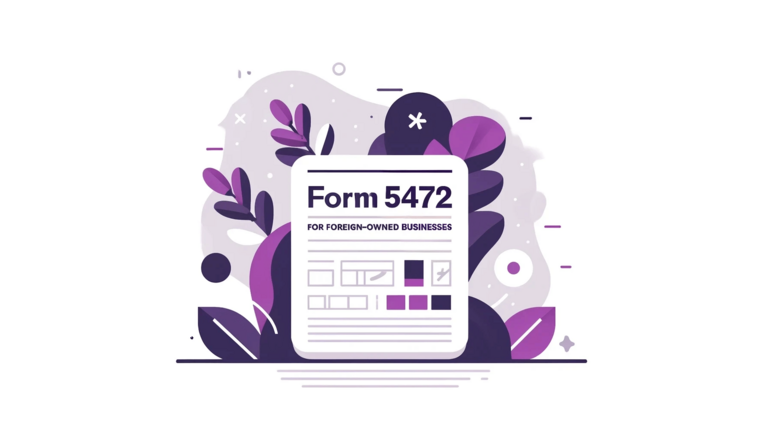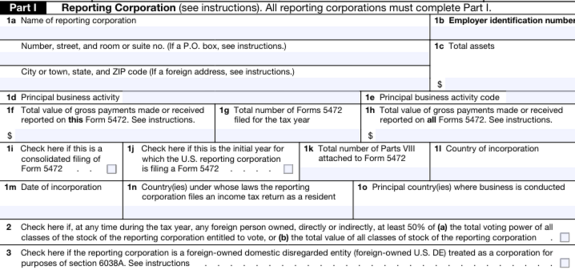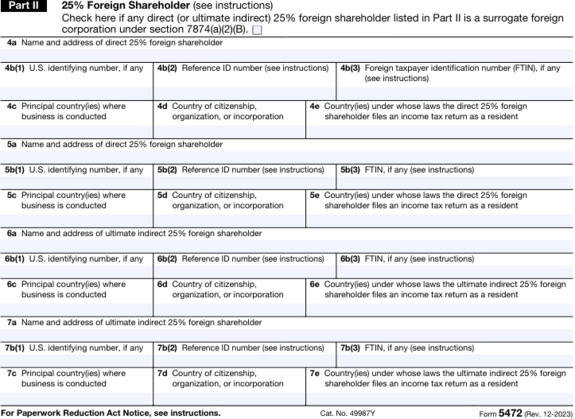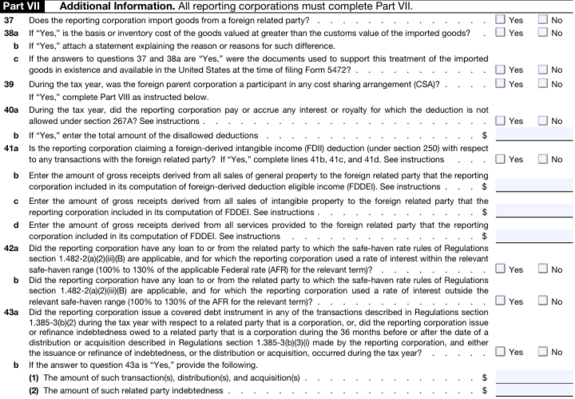Guide to Form 5472: filing requirements and instructions

Form 5472 is an important document for foreign companies doing business in the United States. This form helps ensure that these companies comply with US tax regulations regarding their related party transactions. The form is complex, and proper filing is essential to avoid significant penalties.
This guide provides a detailed walkthrough of Form 5472 instructions to help foreign-owned companies navigate the complexities of US tax reporting requirements.
What is Form 5472?
Form 5472 is an Internal Revenue Service (IRS) form required for certain foreign-owned businesses operating in the US.
It is used to report transactions between these businesses and related parties, helping the IRS monitor compliance with tax laws.
Who must file Form 5472?
Form 5472 must be filed by two main types of entities:
1. US corporation that is 25% foreign-owned.
2. Foreign corporation engaged in a US trade or business.
These entities must file if they had reportable transactions with a related party during the tax year. This form discloses transactions between these entities and their foreign-related entities, subject to IRS scrutiny.
What triggers the Form 5472 filing requirement?
Form 5472 filing requirements are triggered by reportable transactions between the reporting entity and a related party. These transactions include:
- sales of goods
- provision of services
- rents or royalties
- commissions
- loans or advances
- payments for shared costs
Accurate reporting of these transactions is critical because they often involve transfer pricing issues that can lead to audits if not properly documented or reported.
Preparing to complete Form 5472
What documentation is required?
Before completing Form 5472, gather:
- identifying information about the reporting entity
- details about foreign and domestic related parties
- financial records, including invoices, contracts, and ledger entries
Proper documentation ensures compliance and minimizes errors.
How to avoid common pitfalls?
Filing Form 5472 can be fraught with challenges that can lead to errors. Common pitfalls include:
- failure to report all required transactions due to a misunderstanding of what constitutes a reportable transaction
- inaccurately classifying related parties
- missing the filing deadline
To avoid these problems, double-check the completeness and accuracy of all information, strictly adhere to IRS deadlines, and consult with tax professionals when uncertainties arise.
Form 5472 instructions
Part 1: Information about the reporting corporation

Part I provides basic information about the reporting entity. This includes the corporation's name, employer identification number (EIN), and tax year.
You must also indicate whether the corporation is the reporting corporation or a foreign-owned US disregarded entity. It's important to make sure all information is accurate and up to date.
Part 2: Information about the foreign or domestic related parties

Part 2 requires information about each related party with whom the reporting entity had transactions during the tax year.
This includes the name, address, and country of the related party, as well as its unique identification number, such as a US TIN or foreign equivalent.

In this part, the relationship between the reporting entity and the related party is further classified.
Details such as the nature of the relationship and percentage of ownership are required.
Part 4: Monetary Transactions between the Reporting Corporation and the Foreign Related Party

Part 4 is a detailed listing of all monetary transactions between the reporting company and each related party.
This includes but is not limited to, purchases, sales, loans made or received, rents, and royalties. Each type of transaction must be reported separately with the total monetary value for the tax year.
Part 5: Reportable Transactions of a Reporting Corporation That Is a Foreign-Owned US D.E.

In Part 5, you must detail all reportable transactions involving a foreign-owned US disregarded entity (D.E.).
This part focuses specifically on transactions that do not directly involve the foreign parent, but are significant within the operational structure of the D.E.
Part 6: Nonmonetary and Less-Than-Full Consideration Transactions Between the Reporting Corporation and the Foreign Related Party

This section requires the reporting of all transactions that do not involve an exchange of money or that are made for less than full consideration.
Examples include transfers of property, stock swaps, or barter transactions, which must be accurately valued in the report.
Part 7: Additional Information

Part 7 allows you to provide any additional information that may help clarify or explain the data provided in other sections of Form 5472.
This could include context for unusual transactions or changes in corporate relationships.
Part 8: Cost Sharing Arrangement (CSA)

In this section, describe in detail any cost-sharing arrangements as defined by IRS regulations.
Include the nature of the shared costs, the parties involved, and the method used to allocate the costs.
Part 9: Base Erosion Payments and Base Erosion Tax Benefits Under Section 59A

This final section relates to the reporting of base erosion payments and tax benefits as required by the Tax Cuts and Jobs Act.
It includes detailed reporting of transactions that could potentially erode the US tax base, such as payments to foreign related parties that are deductible in the US.
Filing and compliance
When and where to file Form 5472?
Form 5472 filing deadline aligns with the due date of the reporting corporation's income tax return. If necessary, businesses can apply for a Form 5472 extension by filing Form 7004.
Missing the deadline can lead to penalties of $25,000 or more, making it critical to plan and file on time.
The specific IRS center for filing depends on the state in which the corporation is located, as detailed in the IRS instructions.
Electronic vs. paper filing options
The IRS encourages electronic filing for more accurate and faster processing. However, paper filings are also accepted.
Companies should consider their specific circumstances and consult with a tax professional, possibly engaging corporate tax preparation services, to determine the best method for their situation.
Bottom line
Form 5472 is a critical IRS form for foreign-owned businesses designed to monitor and ensure compliance with US tax laws regarding related party transactions.
Correct filing of this form is essential to avoid significant penalties and maintain transparent financial practices.
Avoid surprise penalties – get a tax planning consultation
Learn moreFAQ
A reportable transaction includes any exchange of money or property between the reporting company and its related parties, such as sales, services, rents, royalties, or loans.
Yes, any US corporation that is at least 25% foreign-owned must file Form 5472 if it has reportable transactions with a foreign or domestic related party.
Yes, if the LLC is treated as a disregarded entity and is 100% owned by a foreign person, it must file Form 5472 to report related party transactions.
Disclaimer: This article is for informational purposes only and does not constitute legal or tax advice. Always consult with a tax professional regarding your specific case.

Ines Zemelman, EA, is the founder and president of TFX, specializing in US corporate, international, and expatriate taxation. With over 30 years of experience, she holds a degree in accounting and an MBA in taxation. See more
Further reading


